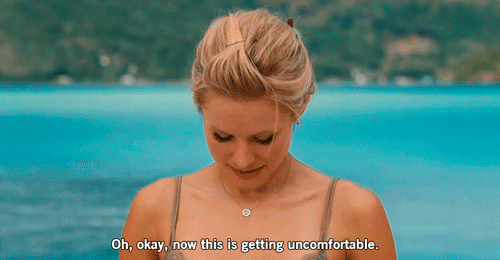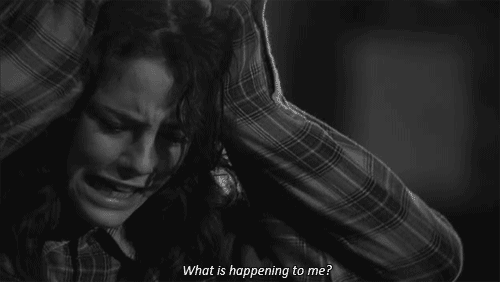Did you catch it?
"All deaf children have some cognitive challenges" - Bouton

Yeah. That's what the parent/science writer got from Dr. Marc Marschark, according to the author/deaf CI user.
However, our favorite Cued Speech advocate/researcher never made that statement. That's what happens when you make assumptions based on what you read. It sounds like the science writer inferred from the information she came across that deaf children had cognitive challenges as a result of hearing loss.
You gotta love the internet.
I wonder if Bouton is already feeling the heat for that one line, especially how she framed it the way she did. After all, reading that one line makes me think that Dr. Marschark said that statement himself, even though I know better. However, if Denworth truly believed that all deaf children had some cognitive challenges as a result of reading Dr. Marschark's work, then woops.

Imagine Dr. Marschark's reaction when he saw the article for himself.
"I was surprised to read the New York Times article A Son’s Deafness Prompts a Scientific Journey and learn that its author, Ms. Bouton, with whom I have never spoken, had written that I stated that “All deaf children have some cognitive challenges.” Not only have I never said that, there is no evidence to support such a claim.
When I do presentations about raising and educating deaf children for parents, teachers, and other audiences around the world, one of my clearly stated conclusions, based on the research evidence, is “differences do NOT equal deficiencies.”
Sadly, throughout history, many in our society have believed that individuals who are deaf are less intelligent than those who hear. The evidence simply does not support that perspective. To suggest that “all deaf children have some cognitive challenges” is not only incorrect, it is insensitive. And for Ms. Bouton and the Times to be unwilling to correct the record is simply wrong." - Dr. Marschark's Pet Project
That has got to be awkward for both Bouton and Denworth.

[EDIT 4/17/2014] The NY Times has posted a correction on the statement basically stating Dr. Marschark's comment was "incorrectly paraphrased." Katherine Bouton is a former NYT editor...
Another point I found interesting because Bouton felt the need to include this:
"He scores 100 percent on a speech recognition test, though this does not mean he hears the way hearing children do." - Bouton

That "speech recognition test" I know so well. Average 2 audiology visits a year, with 30 minutes minimum of speech recognition testing and that's at least 60 hours spent in the booth for a 30 year old. Personally, I think I've spent maybe at least 150 hours in the booth listening to the audiologist say words like "hotdog," "baseball," and so on. I can do 100% on these tests, yet when it comes to speech discrimination in noise, it's a bitch. I think my best score was 40%.

However, this quote takes the cake. Ready to get pissed off?
"From my own experience, I would ask if there are any deaf adults for whom language is not an issue." - Bouton

WOW! I cannot imagine the subtle dig at the deaf community. Aren't you mad! Aren't you angry! Well, I'm not. This is the kind of stuff I would typically hear from brainwashed parents at AG Bell conferences and snotty AVT specialists who believe sign language is truly harmful to spoken language development.
This ... is... audism...
Even deaf people are guilty of audism too, as evidenced in Bouton's case. Yet, it's up to us to prove these naysayers wrong about the idea of deaf people acquiring language in the absence of audition. Deaf children of deaf parents or fluent signers have that advantage of first language exposure and the same applies to deaf children of parents who cue as well.
In the end, Denworth shouldn't be crucified for what she believed to be true in her mind. After all, it's not her fault we live in a society that's audio-centric. We shouldn't crucify Bouton either because she doesn't have that experience of deafness like we do. After all, she lost her hearing at age thirty.
The point here is you don't consciously become an audist. It's ingrained into your subconscious based on the environment in which you live in.
Here's an example of subconscious racism.
There was a 7 year old deaf boy who went into a Hardee's with his parents in this rural town in North Carolina. When he walked into the restaurant, he asked "Why are there so many black people?" At that moment, the mother froze and turned red in embarrassment. She had heard her own son say something racist.

That boy would go on to sit with the lonely black kid at lunch during school a few years later and establish friendships with people of African-American heritage.
It wasn't an overnight transformation, but I eventually was able to let go of my subconscious racism, which was a product of the culture I lived in.
That boy would go on to sit with the lonely black kid at lunch during school a few years later and establish friendships with people of African-American heritage.
It wasn't an overnight transformation, but I eventually was able to let go of my subconscious racism, which was a product of the culture I lived in.
Just because we make racist comments without realizing it doesn't necessarily mean we're consciously racist. The same thing applies to audism.
Help educate Katherine Bouton on the issue of language and deafness. Keep it positive and empower her to learn more about the challenges we have faced growing up with hearing loss. Keep pushing the idea that you can acquire language naturally through sign language or Cued Speech. Let's redefine #deaf.

Help educate Katherine Bouton on the issue of language and deafness. Keep it positive and empower her to learn more about the challenges we have faced growing up with hearing loss. Keep pushing the idea that you can acquire language naturally through sign language or Cued Speech. Let's redefine #deaf.
